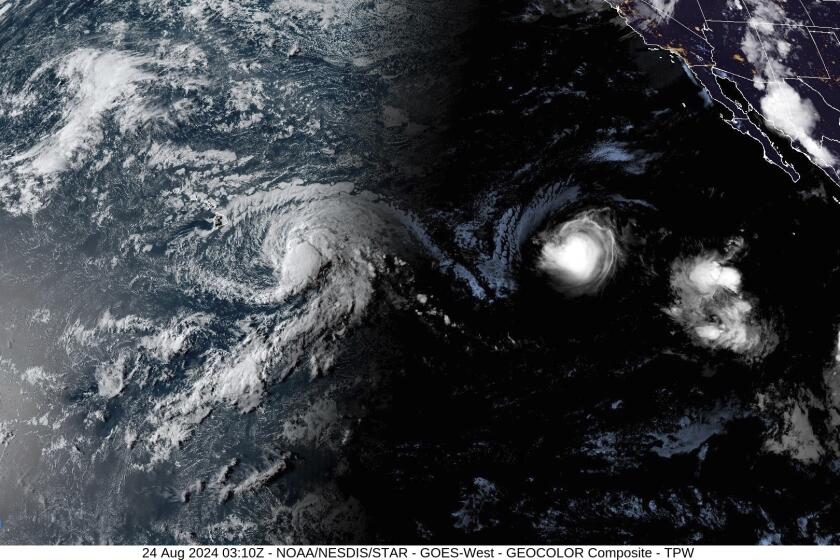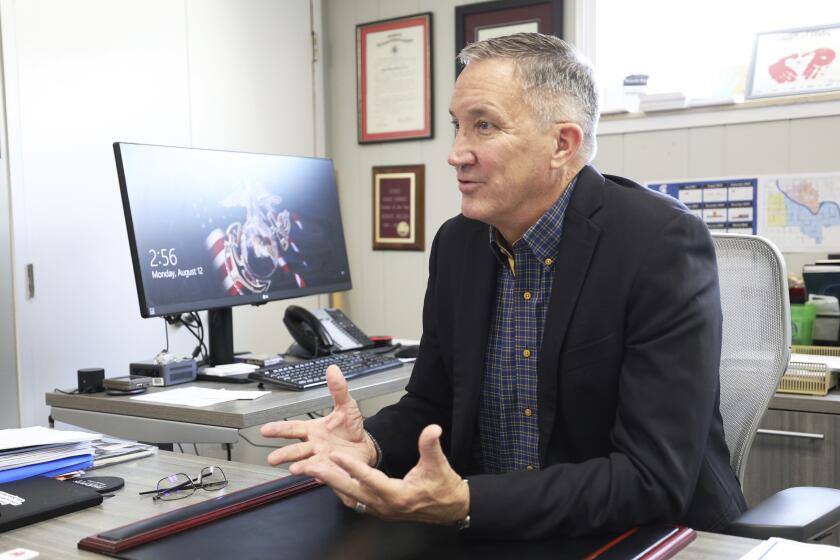Drug War Stepped Up in Colombia and Peru : Bogota Reportedly to Extradite 3 More Suspected Traffickers
The Colombian government was reported Sunday to have approved the extradition of three more suspected cocaine traffickers to the United States, and troops pressed on with a barrage of raids against the drug kingpins’ luxury estates.
The National Drugs Council issued extradition orders for an alleged trafficker, 37-year-old Ana Elena Beatriz Zuniga, the Bogota newspaper El Espectador said. The Associated Press said that two more orders also were approved, for suspected money launderers Bernardo Londono Quintero, 40, and Alberto Orlandes Gamboa, 37.
All three are being held in Bogota following their arrests in security sweeps after traffickers murdered Sen. Luis Carlos Galan on Aug. 18. The three are not among the dozen most-wanted traffickers sought by the U.S. government but are considered important second-rank operatives for the Medellin cartel.
The government last week sent Eduardo Martinez Romero to the United States in the first extradition since President Virgilio Barco Vargas reinstated a treaty with the United States that the Colombian Supreme Court had ruled unconstitutional on a technicality in 1987. Martinez was regarded as the “finance minister” of the Medellin cartel.
Extradition is regarded as a crucial weapon in Barco’s campaign because the traffickers have thoroughly terrorized and corrupted the Colombian judiciary by killing more than 50 judges in recent years--and at least eight this year alone.
Those for whom extradition orders are issued have five days to appeal after they are notified. Martinez’s appeal was denied.
The Colombian government’s resolve in moving forward with extraditions is regarded as a principal test of its commitment to the crackdown waged since the death of Galan, who was the leading presidential candidate of the ruling Liberal Party for next year’s elections.
Nearly 100 Colombians are sought in the United States on drug charges.
“The Extraditables,” as the wanted traffickers call themselves, have declared all-out war on the government, saying they prefer to die in Colombia rather than languish in American prisons.
Campaign of Violence
The cartel continued its campaign of bombings and killings over the weekend in the city of Medellin, bombing a liquor factory and setting a garbage truck afire. Explosions have occurred almost daily for nearly three weeks, some of them killing and wounding passers-by.
The military disclosed that it raided 42 homes and ranches of traffickers during the past week in the Magdalena Medio district, about 100 miles north of Bogota, and 21 were confiscated. Barco’s emergency declaration empowers the government to make such seizures.
The confiscated lands included homes belonging to Pablo Escobar and Gonzalo Rodriguez Gacha, the two top leaders of the Medellin cartel, El Espectador said. One property belonging to Gacha featured Italian marble walls, the newspaper quoted Brig. Gen. Carlos Julio Gil as saying.
Anselmo Ortiz Perdomo, the mayor of Puerto Boyaca in the heart of Magdalena Medio, told reporters that his town had neither drug traffickers nor paramilitary death squads, despite widespread documentation to the contrary. He said he opposes Barco’s plan to appoint military mayors in districts where drug traffickers have virtually seized control of civic life.
“The inhabitants (of Puerto Boyaca) are people of peace,” he said.
Trained to Act as Private Armies
Gil countered, however, that the ranches were home to hundreds of peasants who were trained to act as private armies of the traffickers. The officer said that the security forces had long known of the sites but were legally powerless to act against them for lack of authorization until Barco issued his decree.
The government has offered rewards of $250,000 for information leading to the capture of Escobar and Rodriguez Gacha. This marks the first time that Colombia has offered such awards. Television ads implore citizens to take part in the struggle against the cartels by helping police track the two most-wanted men. After initially focusing on the search for the top dozen suspects, most attention seems now devoted to Escobar and Rodriguez Gacha.
To encourage public support, the government has emphasized the incalculable and ostentatious wealth of the traffickers.
The properties seized during the week, Gil noted, contained about 600 head of cattle, 80 fighting cocks and 200 exotic birds on land extending over more than 17,000 acres.
The U.S. Embassy announced that a new batch of supplies arrived Saturday as part of the emergency $65 million in aid approved by President Bush to help Colombia wage its struggle against the traffickers.
Military Equipment Shipment
The supplies, brought in aboard a C-41 Starlifter cargo plane, included eight jeeps and a shipment of military equipment for the national police. It was the fourth delivery made over the past week. Other items have included two C-130 cargo planes, eight A-37 twin-engine subsonic jet planes and five UH-1 helicopters, as well as bullet-proof vests for judges.
The extra air power is important for reaching laboratories and tracking clandestine flights from Peru carrying loads of partially refined coca paste.
A Colombian intelligence official said recently that the helicopters, especially, will greatly improve enforcement capabilities. “They are the battle horses, so to speak, for entering areas such as the jungle,” he said.
More to Read
Sign up for Essential California
The most important California stories and recommendations in your inbox every morning.
You may occasionally receive promotional content from the Los Angeles Times.






